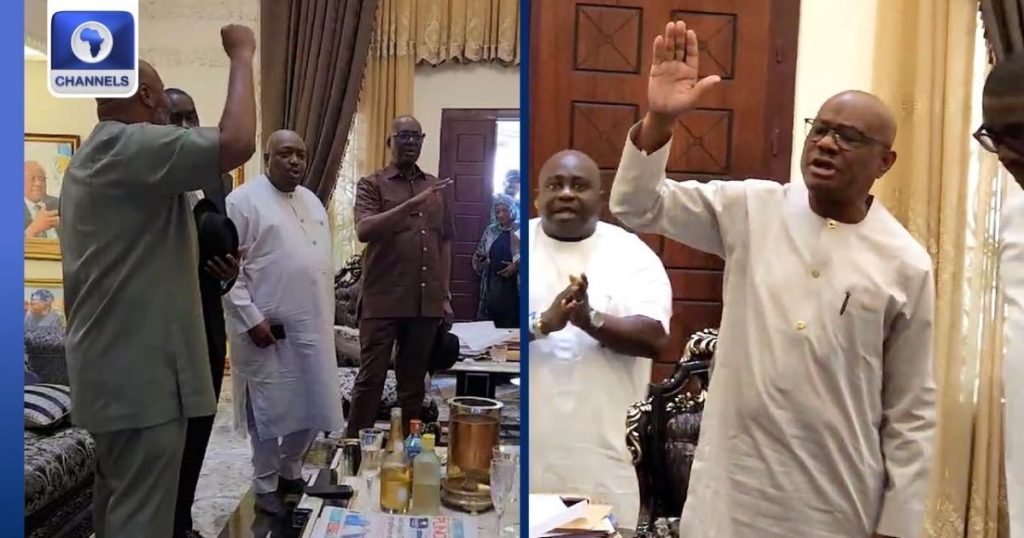Paragraph 1: The Triumphant Return and the Supreme Court’s Decree
Nyesom Wike, the Minister of the Federal Capital Territory (FCT), found himself in a celebratory mood following a landmark Supreme Court ruling that significantly reshaped the political landscape of Rivers State. A video captured Wike expressing his gratitude to God after the apex court nullified the recently conducted local government elections and affirmed the legitimacy of the 27-member State Assembly led by Martin Amaewhule. This decision, delivered on a Friday in Abuja, brought an end to a period of intense political wrangling and uncertainty in Rivers State. Wike proclaimed that the Supreme Court’s intervention had effectively quelled the crisis that had gripped the state. The court’s pronouncements had far-reaching implications, including a financial constraint on the Rivers State government and a decisive resolution of the leadership dispute within the state legislature.
Paragraph 2: Financial Repercussions and the Constitutional Imperative
The Supreme Court’s ruling extended beyond the validation of the state assembly’s composition. It imposed a significant financial restriction on the Rivers State government, prohibiting the Central Bank of Nigeria (CBN) from releasing funds to the state until the Rivers House of Assembly was properly constituted according to the 1999 Constitution. This directive stemmed from the court’s observation that the state lacked a valid Appropriation Act, a necessary legal framework for the disbursement of public funds. A five-member panel, speaking through Justice Emmanuel Akomaye Agim, delivered a unanimous decision upholding a previous Federal High Court judgment that had imposed a similar financial embargo on the state government. This twin affirmation of the lower court’s decision underscored the gravity of the constitutional breach and the court’s commitment to upholding due process in the management of public finances.
Paragraph 3: Affirmation of Legislative Authority and the Power Struggle
Central to the Supreme Court’s ruling was the affirmation of the Martins Amaewhule-led 27-member House of Assembly as the legitimate legislative body of Rivers State. This declaration effectively settled the protracted leadership tussle that had plagued the state’s legislative arm. The dispute had created a power vacuum and hampered the smooth functioning of the state government. The Supreme Court’s intervention not only resolved the leadership question but also reinforced the principle of constitutionalism by emphasizing the importance of a properly constituted legislature in a democratic system.
Paragraph 4: Implications for Governance and Political Stability
The Supreme Court’s verdict marked a turning point in the political trajectory of Rivers State. The nullification of the local government elections signaled a fresh start for local governance, potentially leading to a more representative and accountable administration at the grassroots level. The affirmation of the Amaewhule-led State Assembly paved the way for the restoration of legislative normalcy and the resumption of lawmaking activities. This, in turn, was expected to contribute to greater stability and predictability in the state’s governance.
Paragraph 5: Contextualizing the Crisis and the Path to Resolution
The power struggle within Rivers State had deep roots, stemming from disagreements over control of the state legislature and local government administration. These disagreements escalated into a full-blown crisis, threatening the stability and progress of the state. The Supreme Court’s intervention provided a much-needed resolution, offering a legal and constitutional framework for moving forward. This intervention was not merely a legal pronouncement but a crucial step towards restoring political order and fostering an environment conducive to good governance.
Paragraph 6: The Aftermath and the Future of Rivers Politics
The Supreme Court’s decisions resonated far beyond the immediate legal implications. It sent a strong message about the importance of adherence to constitutional principles and the rule of law. The verdict’s emphasis on due process in the management of public funds served as a reminder of the government’s responsibility to act transparently and accountably. The resolution of the legislative leadership dispute also underscored the significance of a functioning and legitimate legislature in a democratic society. The Supreme Court’s intervention, while marking the end of one chapter in Rivers State’s political history, also signaled the beginning of a new era, one characterized by the hope for greater stability, improved governance, and a renewed commitment to the principles of democracy.


